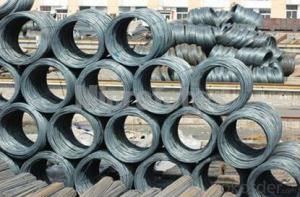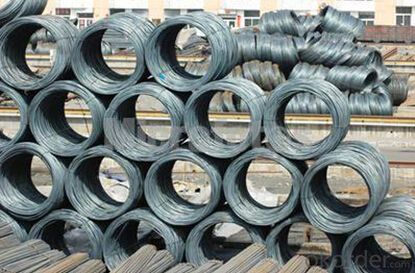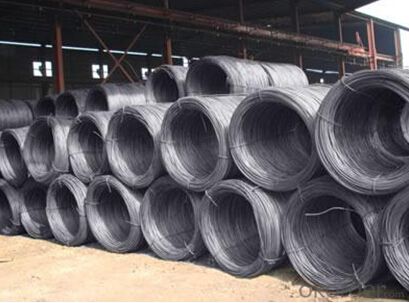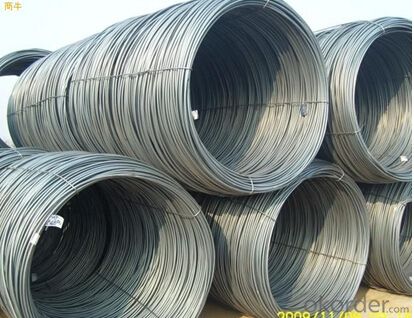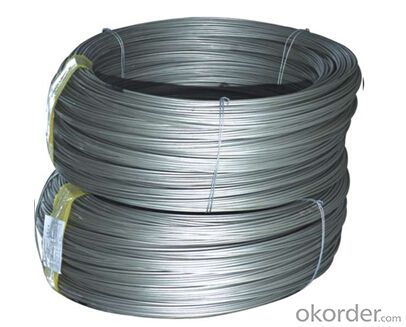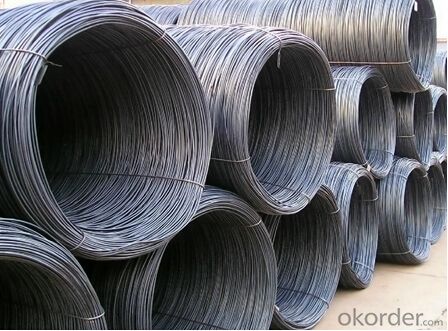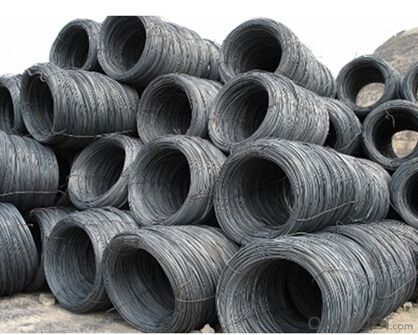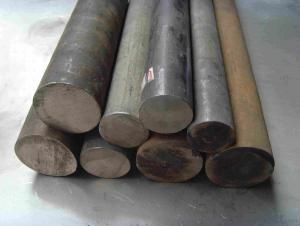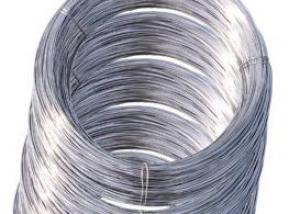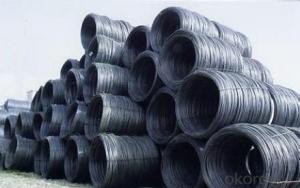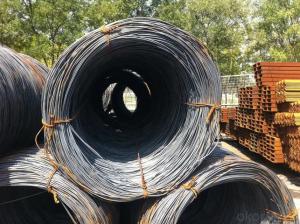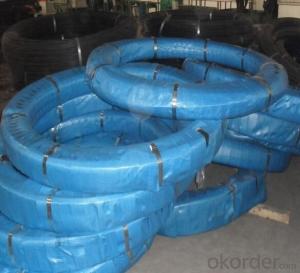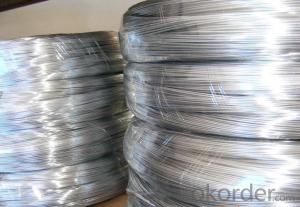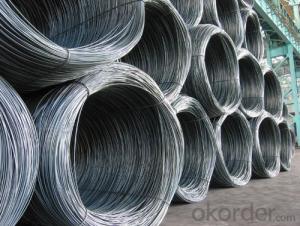Diameter 10mm AISI 304 Stainless Steel Wire Rod
- Loading Port:
- Tianjin
- Payment Terms:
- TT OR LC
- Min Order Qty:
- 1 m.t.
- Supply Capability:
- 10000 m.t./month
OKorder Service Pledge
Quality Product, Order Online Tracking, Timely Delivery
OKorder Financial Service
Credit Rating, Credit Services, Credit Purchasing
You Might Also Like
Specification
Type:
Carbon Steel,Spring Steel,Bearing Steel,Gear Steel,Deformed Steel,Stainless Steel,Alloy Steel
Shape:
Steel Coil,Steel Sheet,Steel Wire Rod,Steel Flat Bar,Steel Square Bar,Steel Angle,Steel Round Bar,Steel Billets
Technique:
Hot Rolled,Cold Rolled,Cold Drawn,ERW,Forged,Saw,Extruded,EFW,Spring
Surface Treatment:
Galvanized,Coated,Copper Coated,Color Coated,Oiled,Dry,Chromed Passivation,Polished,Bright,Black,PVDF Coated
Certification:
ISO,SGS,BV,IBR,RoHS,CE,API,BSI,UL
Thickness:
5.5mm--10mm
Width:
5.5mm--10mm
Length:
In coils
Outer Diameter:
5.5mm--10mm
Net Weight:
2m.t.
Packaging:
Seaworthy packaging
Diameter 10mm AISI 304 Stainless Steel Wire Rod
Detailed Information of the Diameter 10mm AISI 304 Stainless Steel Wire Rod
| Name | Hot Rolled High Carbon Wire Rod |
| Shape | Round Bar/Square Bar/Flat Bar/Plate/Wire |
| Standard | GB/ASTM/SAE/AISI/DIN/JIS/EN/BS |
| Surface Treatment: | Black/Peeling/Polished/Machined |
| Delivery Condition: | Hot Rolled or Forged/Peeled or Black Surface |
| Test | SGS/UT 100% Elements Testing |
| Certificate: | ISO/Mill Certificate |
| Service: | 24 hours online service / |
| more than 20 years trading and manufacture | |
| Quality Assurance: | the third party inspection, such as SGS, BV, TUV…etc. is acceptable |
| Packaging Details: | Seaworthy Packaging or as per customer's packing instruction |
Chemical Composition of the Diameter 10mm AISI 304 Stainless Steel Wire Rod
| Material | C %(≤) | Mn % (≤) | P % (≤) | S % (≤) | Si % (≤) | Cr% (≤) |
| 430 | 0.08 | 1 | 0.04 | 0.03 | 1 | 16.00-18.00 |
Company Introduction of the Diameter 10mm AISI 304 Stainless Steel Wire Rod
CNBM International Corporation is the most import and export platform of CNBM group(China National Building Material Group Corporation) ,which is a state-owned enterprise, ranked in 270th of Fortune Global 500 in 2015.
With its advantages, CNBM International are mainly concentrate on Cement, Glass, Iron and Steel, Ceramics industries and devotes herself for supplying high quality series of refractories as well as technical consultancies and logistics solution.
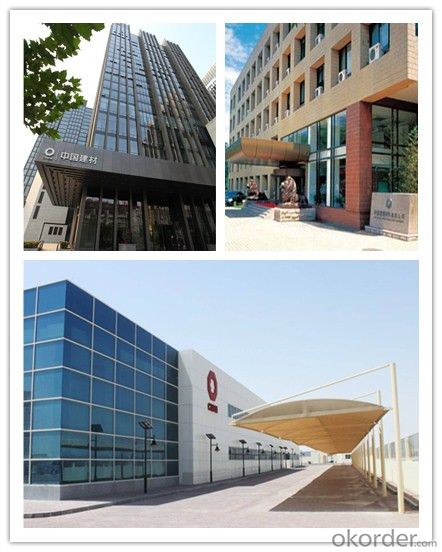
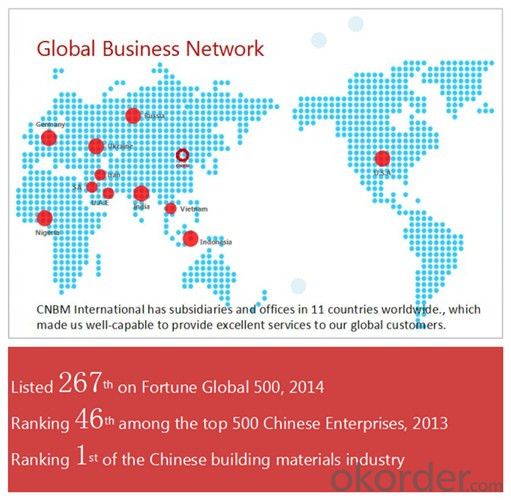
| After-sale service | CNBM provides the services and support you need for every step of our cooperation. We’re the business partners you can trust; you can relax and get on with doing business. |
| For any problem, please kindly contact us at any your convenient time, we’ll reply you in our first priority within 24 hours | |
| Advantages | Industry experience over 20 years. |
| Shipment of goods -More than 70 countries worldwide. | |
| The most convenient transport and prompt delivery. | |
| Competitive price with best service. | |
| High technical production line with top quality products. | |
| High reputation based on best quality products. |
Packaging & Delivery the Diameter 10mm AISI 304 Stainless Steel Wire Rod
| Packaging Detail | Sea worthy packing /as per customer's packing instruction |
| Delivery Detail | 15 ~ 40 days after receiving the deposit |
Products Show
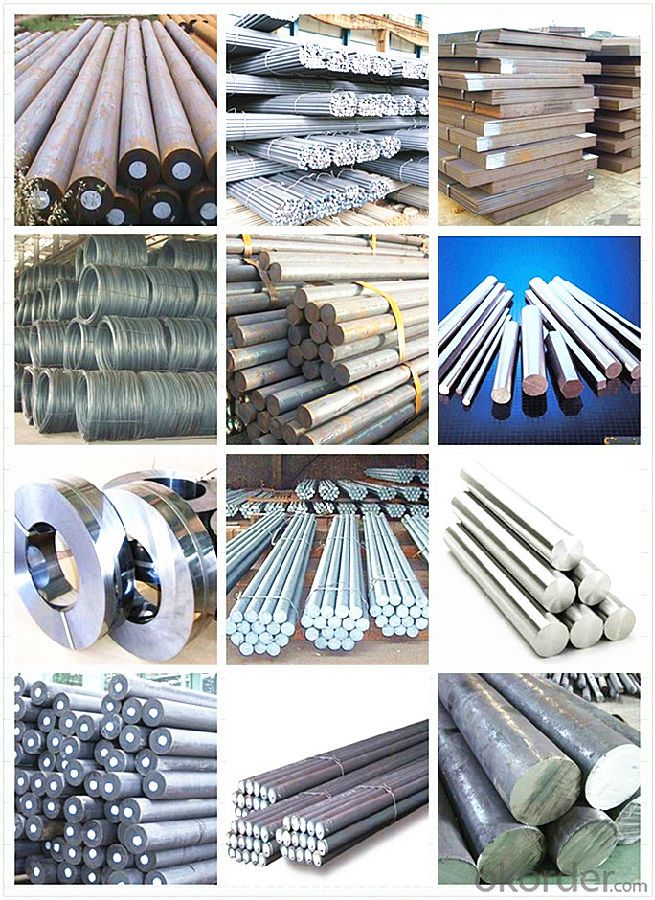
FAQ:
| Are you a trader or manufacturer? | Manufacturer |
| What’s the MOQ? | 3 metric ton |
| What’s your delivery time? | 15-35 days after downpayment received |
| Do you Accept OEM service? | Yes |
| what’s your delivery terms? | FOB/CFR/CIF |
| What's the Payment Terms? | 30% as deposit,70% before shipment by T/T |
| Western Union acceptable for small amount. | |
| L/C acceptable for large amount. | |
| Scrow ,Paybal,Alipay are also ok | |
| Why choose us? | Chose happens because of quality, then price, We can give you both. |
| Additionally, we can also offer professional products inquiry, products knowledge train (for agents), smooth goods delivery, excellent customer solution proposals. | |
| What's your available port of Shipment? | Main Port, China |
| What’s your featured services? | Our service formula: good quality+ good price+ good service=customer's trust |
| Where are your Market? | Covering more than 160 countries in the world |
- Q: How does special steel contribute to the marine industry?
- Special steel plays a crucial role in the marine industry by offering exceptional strength, durability, and corrosion resistance, making it ideal for various marine applications. It is extensively used in the construction of ships, submarines, offshore platforms, and other marine structures, ensuring their structural integrity and safety. Additionally, special steel is used in manufacturing propellers and other critical components, enhancing efficiency and performance. Overall, special steel contributes significantly to the marine industry by providing reliable and high-quality materials that withstand harsh marine environments and support the growth and advancement of the sector.
- Q: How does special steel contribute to the flexibility of products?
- There are multiple ways in which special steel contributes to the flexibility of products. Firstly, its high strength and durability are well-known, enabling manufacturers to create products that can withstand heavy loads or extreme conditions. This allows for the production of flexible products suitable for various applications, ranging from automotive parts to construction materials. Furthermore, special steel possesses exceptional ductility and malleability, meaning it can be easily shaped, bent, or molded into different forms without compromising its structural integrity. This flexibility in design empowers manufacturers to produce products with intricate details and complex shapes, meeting specific customer demands or industry standards. Moreover, special steel's resistance to corrosion and wear guarantees that products made with this material have a longer lifespan and can endure harsh environments. This enhances the flexibility of products by minimizing the need for frequent replacements or repairs, ultimately saving time and costs for both manufacturers and end-users. Additionally, special steel's ability to maintain its mechanical properties at high temperatures makes it suitable for applications where thermal stability is vital. This enables the production of products that can function reliably in extreme heat or cold conditions, expanding their potential uses in industries such as aerospace, energy, or manufacturing. To summarize, special steel's high strength, ductility, corrosion resistance, and thermal stability all contribute to the flexibility of products. By providing a versatile and dependable material, special steel facilitates the production of products that can adapt to diverse requirements and environments, offering improved performance and longevity.
- Q: What are the properties of precipitation-hardening steel?
- Precipitation-hardening steel, also known as PH steel, possesses several notable properties. One of its key features is its ability to be strengthened through a heat treatment process, known as precipitation hardening. This process involves heating the steel to a specific temperature and then rapidly cooling it, followed by aging at a lower temperature. This treatment causes the formation of fine particles within the steel, leading to increased strength and hardness. Another important property of precipitation-hardening steel is its excellent combination of strength and corrosion resistance. This steel alloy is often used in applications where both high strength and resistance to corrosion are required, such as in aerospace and marine industries. Additionally, precipitation-hardening steel offers good weldability, making it suitable for various fabrication processes. Furthermore, this type of steel is known for its versatility as it can be tailored to meet specific mechanical properties by adjusting the heat treatment parameters. This allows manufacturers to customize the steel's strength, toughness, and other characteristics according to the desired application. In summary, precipitation-hardening steel is characterized by its ability to be strengthened through a heat treatment process, its excellent combination of strength and corrosion resistance, and its versatility in achieving desired mechanical properties.
- Q: How does special steel perform in extreme weather conditions?
- Special steel is specifically designed to have enhanced performance in extreme weather conditions. It exhibits exceptional strength, durability, and resistance to corrosion, making it highly suitable for withstanding harsh environments such as extreme heat, cold, humidity, and strong winds. Additionally, special steel maintains its mechanical properties and structural integrity even under extreme temperature variations, ensuring its reliability and longevity in adverse weather conditions.
- Q: How does special steel perform in terms of corrosion resistance in acidic environments?
- Special steel, such as stainless steel, exhibits excellent corrosion resistance in acidic environments due to its high chromium content. The chromium forms a protective oxide layer on the surface of the steel, preventing the corrosive attack of acids. This makes special steel a reliable choice for applications where exposure to acidic environments is a concern.
- Q: Can special steel be used in the railway industry?
- Yes, special steel can be used in the railway industry. Special steel, such as high-strength steel or corrosion-resistant steel, can be utilized for various applications in the railway industry, including the construction of tracks, bridges, and locomotives. These types of steel offer enhanced durability, strength, and resistance to wear and tear, making them suitable for the demanding conditions and heavy loads encountered in the railway sector.
- Q: How does special steel contribute to the aerospace material weight reduction?
- Special steel contributes to aerospace material weight reduction by providing a lightweight yet strong and durable material option. Its unique properties, such as high strength-to-weight ratio and excellent corrosion resistance, allow for the construction of lighter aircraft components without compromising on safety or performance. This reduction in weight leads to improved fuel efficiency, increased payload capacity, and enhanced maneuverability, making special steel an essential element in aerospace industry's ongoing efforts to achieve greater fuel economy and sustainability.
- Q: What are the different forging techniques for special steel parts?
- There are several forging techniques that can be used for special steel parts, including open die forging, closed die forging, and ring rolling. Open die forging involves shaping the steel by repeated hammering or pressing between flat dies, allowing for a range of shapes and sizes. Closed die forging, on the other hand, utilizes specially designed dies to shape the steel into a specific form, resulting in higher precision. Ring rolling involves shaping a circular piece of steel into a seamless ring by applying pressure from radial rolls. These techniques offer varying advantages depending on the desired shape, size, and properties of the special steel part being forged.
- Q: What are the different methods for improving the impact resistance of special steel?
- Special steel can be made more impact resistant through various methods. These methods fall into three main categories: heat treatment, alloying, and surface treatments. Heat treatment is a commonly used method to improve impact resistance. It involves carefully heating and cooling the steel to change its microstructure. Tempering and quenching are the two primary heat treatment processes used for this purpose. Tempering involves heating the steel to a specific temperature and then slowly cooling it. This helps to relieve internal stresses and increase toughness. On the other hand, quenching involves rapidly cooling the steel after heating it to a high temperature. This results in a hardened microstructure, which enhances impact resistance. Alloying is another method to enhance the impact resistance of special steel. By adding specific elements to the base steel, its properties can be improved. For instance, elements like manganese, nickel, or chromium can be added to increase toughness and impact resistance. These alloying elements modify the steel's microstructure, resulting in enhanced strength and resistance to deformation. Surface treatments are used to provide a protective layer on the steel's surface, thereby improving impact resistance. A commonly employed surface treatment is case hardening, which introduces carbon or nitrogen into the outer layer of the steel. This creates a hard surface while maintaining a tough core, resulting in improved impact resistance. Another surface treatment method is shot peening, where the steel surface is bombarded with small particles under high pressure. This induces compressive stresses in the surface layer, enhancing fatigue and impact resistance. In summary, the impact resistance of special steel can be improved through different methods, including heat treatment, alloying, and surface treatments. These methods can be applied individually or in combination to enhance the steel's mechanical properties, making it more resistant to impact and deformation.
- Q: What are the different types of bearing steel?
- There are several different types of bearing steel, including high-carbon chromium steel, high-carbon chromium-molybdenum steel, and case-hardened steel.
Send your message to us
Diameter 10mm AISI 304 Stainless Steel Wire Rod
- Loading Port:
- Tianjin
- Payment Terms:
- TT OR LC
- Min Order Qty:
- 1 m.t.
- Supply Capability:
- 10000 m.t./month
OKorder Service Pledge
Quality Product, Order Online Tracking, Timely Delivery
OKorder Financial Service
Credit Rating, Credit Services, Credit Purchasing
Similar products
Hot products
Hot Searches
Related keywords
